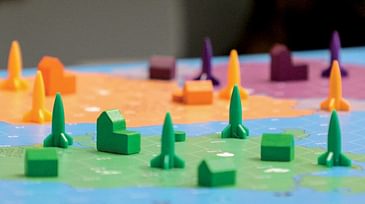Shelly Lesher is joined by John Emery, Assistant Professor of National Security in the Department of International and Area Studies at the University of Oklahoma. His focuses include technology, international relations and the ethics of war. This episode discusses a paper he wrote while at Stanford entitled Moral Choices Without Moral Language: 1950s Political-Military Wargaming at the RAND Corporation.
As the episode begins, John shares his preferred definition of wargaming, which is human interaction to examine human decision-making. While some wargames have very strict rules and limited scopes, others allow for more free play models without constraint. The key for a wargame is that it must immerse human players in a competitive environment with a set of rules to allow them to grapple with the consequences of their actions. The RAND Corporation, standing for research and development, came out of World War II with the realization that technology was essential for the battlefield. By 1948, they had about 200 person staff and expertise in a wide range of fields. In short, it was the early think tank of the U.S. Air Force.
John researched the wargames of the Cold War at the RAND Corporation to determine how they think through the future of war. He was surprised to find more contestation and division between mathematicians and economists on one hand, and the social scientist on the other. Between the two battling divisions, we observe what were really the first concrete attempts to gamify the nuclear world. People dealt with the stress and fear surrounding the situation and decision-making in very different ways. This is one of those situations, John explains, when you can’t understand the conditions people were under and must come from a place of empathy to put yourself in their shoes.
Though wargaming varies heavily, John explains how the social science game was organized to think about the dilemma of international politics' deterrents from a Cold war setting. Their free form play consisted of U.S., European and Soviet teams with experts on all sides. The game was full time for over two weeks and projected future US policy and how they would handle interventions. The goal was to form a more holistic view of strategy integrating military and political actions. The degree to which the Soviet team’s peaceful approach divided NATO gave players precarities of the alliance and the ethical dilemmas of a war in Europe. Because they were time consuming, these games were rare at RAND, though it’s impact prevailed in many who were fascinated by the concept. This social science game proliferated and became commonplace in military academies, academic institutions, and more.
When it comes to the ethics of war and technology, John feels that the level of abstraction disengages moral and ethical intuitions. The centrality of emotion in decision making is one of the key insights from the game we discussed. The conversation then shifts as Shelly points out that every day, fewer and fewer people are alive who know the implications of a nuclear bomb. This is where the role of teaching comes into play, to educate young people on the risks. When you are thinking about the dilemmas of war and don’t have an empirical basis for your estimations, wargaming can be used as a substitute. In closing, John shares what we can learn from these wargames and what happened in the 50’s as we look ahead.
Links:
Read John’s paper, Moral Choices Without Moral Language: 1950s Political-Military Wargaming at the RAND Corporation, here.
Send an email to My Nuclear Life or visit their website.
My Nuclear Life now has a Patreon page, where you can subscribe for bonus content including this month’s episode where Shelly & John discuss their trips to Chernobyl!
Please leave a 5-star review, and don’t forget to subscribe to My Nuclear Life wherever you listen to podcasts!
Production costs for this episode were provided through National Science Foundation Grant PHY-2011267.





